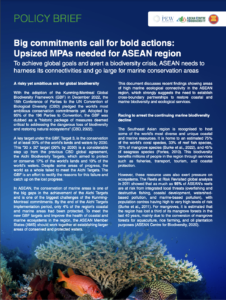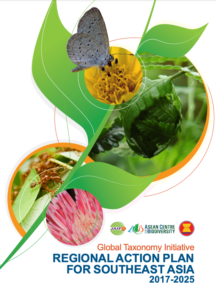INTERVENTION (Bern III – Business Sector)
Dr. Theresa Mundita S. Lim
Executive Director
ASEAN Centre for Biodiversity
The private sector has long been recognised as a key player in biodiversity conservation. Enormous potential for partnerships can be envisaged if sustainability practices are integrated into their operations. Mainstreaming biodiversity calls for a much-needed shift of paradigms, culture and core values, and business processes and models.
In COPs 10 and 11, decisions by the Parties led to the creation of a platform for organisations, private sector, and international organisations among others, towards mainstreaming biodiversity in the business sector—the GPBB. The Global Partnership is working closely with CBD Secretariat with a focus on supporting the implementation and working with large, medium, and small businesses and initiatives on the ground.
With the twin challenges of climate change and biodiversity loss, recognizing that these issues are inextricably linked, is fundamental in navigating the road to sustainability, most especially for a region that is both vulnerable and biodiverse, like the ASEAN. So we are pleased to have been elected as Chair of the GPBB from 2022 to 2024.
Among the targets identified in the KMGBF that are most relevant to the private sector are Targets 14 (full integration of biodiversity and its multiple values into policies, regulations, planning and development processes…within and across all levels of government and across all sectors, in particular those with significant impacts on biodiversity, progressively aligning all relevant public and private activities, fiscal and financial flows with the goals and targets of this framework; ), 15 (disclosure and reporting by business on its dependencies and impacts on biodiversity, including reducing these impacts by 50 per cent;) and 18 (calls to identify by 2025, and eliminate, phase out or reform incentives, including subsidies, harmful for biodiversity, in a proportionate, just, fair, effective and equitable way, while substantially and progressively reducing them by at least 500 billion USD per year by 2030, starting with the most harmful incentives, and scale up positive incentives for the conservation and sustainable use of biodiversity).
Meanwhile, the ASEAN’s business council identified the following priority legacy areas, among others : promoting carbon markets (Carbon Centre of Excellence) and sustainable agriculture ( closed-loop model for agricultural products). By incorporating biodiversity or ecosystem services values and highlighting nature-based solutions into these priorities, we found entry points to partner with the business sector on achieving multiple benefits, including meeting the KMGBF targets. At the moment, we are organising a small group meeting under the GPBB on recommendations for positive incentives for biodiversity-friendly business practices. Hopefully this will be taken on board by Parties of the CBD and other concerned MEAs later on.
Aside from synergy with the UNFCCC, synergies with CITES, CMS, and IPPC is also considered relevant to the business sector, as the sector continue to advance and promote sustainable farming, food production and food harvesting, while complying with regulatory requirements that are perceived to disincentivize sustainable use and investments.
There may be other MEAs that affect the business sector, but we do have the opportunity to discuss all these in the next two days. Since the Meetings and Conferences under these MEAs are, more often, being handled by different focal points coming from different government sectors or agencies, it is not clear how these global policies and guidance are influencing regional and national investment policies, which may be overlapping and possibly even drive inconsistencies, sending confusing signals to business. Perhaps the Bern process would be able to help surface this towards a more coherent and coordinated action across sectors at the regional, subregional and national levels, not only for the benefit of the business community, but also to encourage them to actively contribute to the successful implementation of the Global Biodiversity Framework.

























